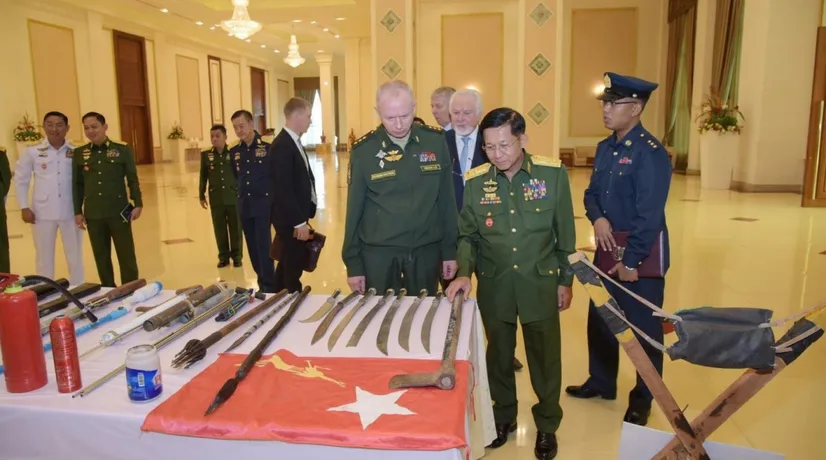To stop Russian aggression, US must act on Myanmar
13 May 2022

Khin Ohmar Published on May 13, 2022
The junta’s alliance with Russia has been a disaster for Myanmar’s people, fuelling a crisis that has been abetted by the international community, activist Khin Ohmar writes
Coup leader Min Aung Hlaing shows items allegedly used by resistance forces to Russia’s Deputy Defence Minister Col Gen Alexander Vasilyevich Fomin in March last year (Myanmar state media)
Over the past year, more military attacks have been launched against civilians in Myanmar than in Syria, Yemen, Iraq or Afghanistan, according to figures compiled by the Armed Conflict Location and Event Data Project, which also designated the country as the world’s deadliest place to be a protester in 2021.
The Myanmar military is using helicopter gunships and jets to bomb wide swathes of the country. Schools, hospitals and places of worship have been targets of heavy shelling. The military has torched the homes of villagers, who have taken shelter in the jungle, finding caves in which to hide and spend sleepless nights. Entire villages have been incinerated. Massacres have become a form of collective punishment against a nationwide civilian resistance, unrelenting in the face of the junta’s brutality.
Some 578,200 people have fled their homes since the military junta staged an attempted coup in February 2021, according to the UN Office for the Coordination of Humanitarian Affairs.
The vicious reprisals and systematic attacks from the junta, enabled by Russian arms and equipment, are as horrific as those committed by Russian forces in Ukraine in recent months.
On Thursday and Friday, President Biden is hosting the leaders of Southeast Asian nations at a special summit in Washington DC, where the US will be looking to garner support from the regional bloc to strengthen the coalition against Moscow. A key component of his strategy should be to convince the members of the Association of Southeast Asian Nations (ASEAN) to change course on the Myanmar junta, one of Russia’s staunchest allies.
The administration can use the opportunity of the US-ASEAN summit to pressure the bloc to go beyond its impotent response to the junta’s flouting of international law and engage with the legitimate National Unity Government, established by and representing the peoples of Myanmar.
But Biden has a chance to go further. The President should call for a global arms embargo against the Myanmar military and direct his UN ambassador to put the matter on the agenda of the UN Security Council, which the US is chairing for the month of May.
An embargo would deliver a direct blow to Russian interests.
Russia is busy selling jet fighters, armoured vehicles, surface-to-air missiles, and mobile defence systems to the Myanmar military. According to the UN Special Rapporteur on the situation of human rights in Myanmar, the transfer of arms by Russia “ha[s] occurred with the full knowledge that they would be used to attack civilians, in probable violation of international law.”
The Russian regime sees the Myanmar junta as a source of hard currency to sustain its autocratic rule.
Since 2018, at least 19 Russian companies have supplied arms and equipment to the Myanmar military—including the US-sanctioned state-owned arms conglomerate Rostec and its multiple subsidiaries. In April 2021, the head of Russia’s truck giant, Kamaz, visited Myanmar to hold talks with the junta about manufacturing trucks in Myanmar. Kamaz produces the vehicle that serves as the platform for the Pantsir-S1 surface-to-air missile system, which the junta ordered from Russia last year.
The ties between the junta and Russia appear to be strengthening. An April 25 letter issued by the Central Bank of Myanmar revealed that junta-backed banks are forming an alliance with Russian banks, according to a recent RFA report. This would provide a back channel for the junta to purchase Russian weapons in defiance of sanctions that seek to banish Russia from the global financial system and stop the junta’s procurement of arms.
The alliance has been a disaster for the Myanmar people. But the crisis has been abetted by the global community—by the ineffectual gestures of ASEAN, by the empty rhetoric of UN statements. The lack of concrete, coordinated international action is allowing Russia to establish a client state in the middle of Asia, destabilising the region while fuelling the junta’s terror.
President Biden has a chance to begin the process of severing the links between the Russian Federation and the Myanmar junta. He can take a stand against the Kremlin’s support for the ongoing campaign of mass killing, torture, sexual violence, and abuse committed by Myanmar’s military junta. The time to act is now.
Khin Ohmar, a prominent human rights activist from Myanmar, is the founder of the rights group Progressive Voice.
Announcements
21 May 2025
Open letter: Malaysia must lead ASEAN with principle, not hypocrisy, to address the Myanmar crisis

Progressive Voice is a participatory rights-based policy research and advocacy organization rooted in civil society, that maintains strong networks and relationships with grassroots organizations and community-based organizations throughout Myanmar. It acts as a bridge to the international community and international policymakers by amplifying voices from the ground, and advocating for a rights-based policy narrative.